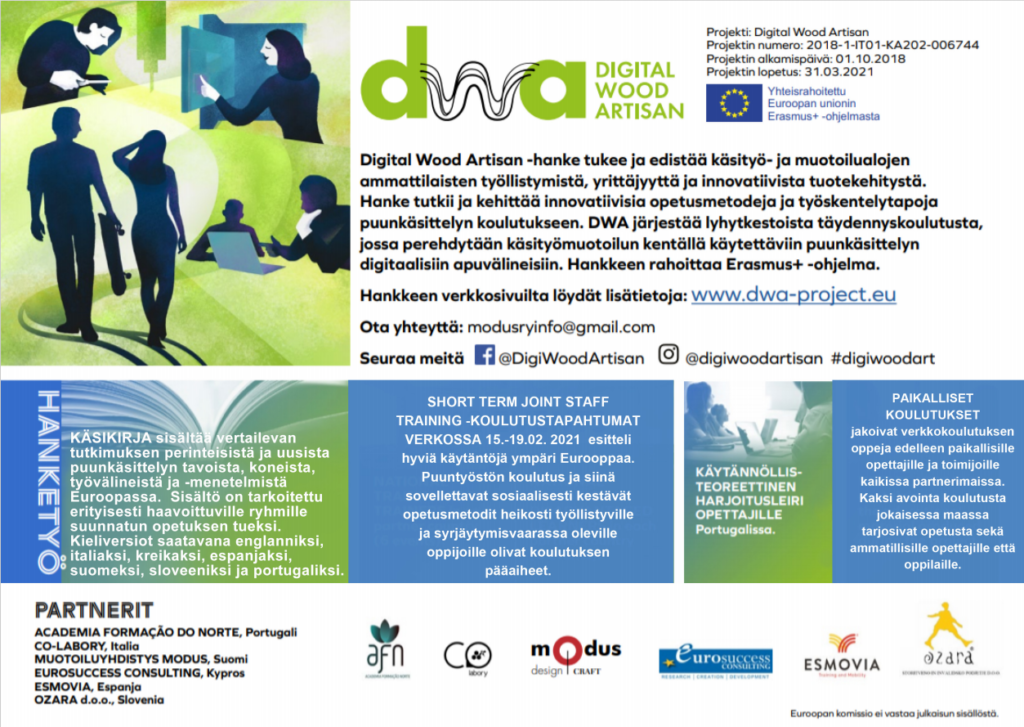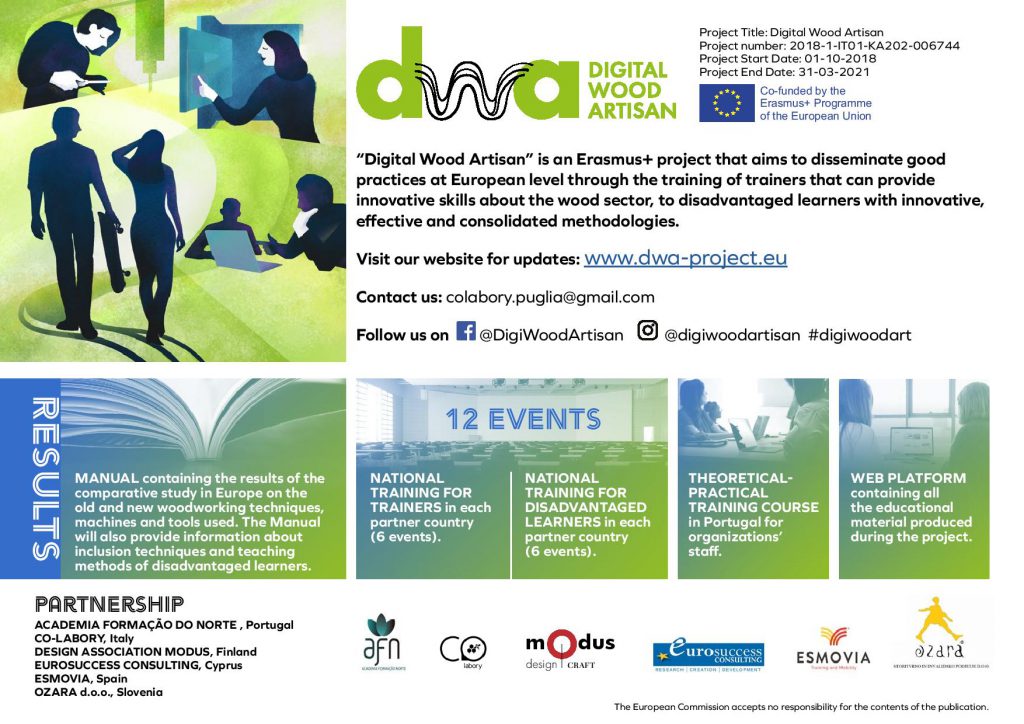
Digital Wood Artisan -hanke on Eurooppa 2020-strategian mukaisesti koulutuksen sisältöä kehittävää toimintaa. DWAn avulla Modus tukee ja edistää käsityö- ja muotoilualojen ammattilaisten työllistymistä, yrittäjyyttä ja innovatiivista tuotekehitystä. Yhdessä eurooppalaisten partnerien kanssa Modus tutkii ja kehittää innovatiivisia opetusmetodeja ja työskentelytapoja puunkäsittelyn koulutukseen. Modus järjestää lyhytkestoista täydennyskoulutusta, jossa perehdytään käsityömuotoilun kentällä käytettäviin puunkäsittelyn digitaalisiin apuvälineisiin. Hankkeen rahoittaa Erasmus+ -ohjelma.
Eurooppa 2020 -strategian avulla EU pyrkii edistämään talouskasvua ja työpaikkojen luomista vuoteen 2020 mennessä. Strategiassa korostetaan älykästä, kestävää ja osallistavaa kasvua. Muut hankkeeseen osallistuvat maat ovat Italia, Kypros, Slovenia, Espanja ja Portugali. Tampereella Modus toteuttaa hanketta yhteistyössä Tampere Hacklabin, Sorvaamo-hankkeen ja Makerspace Tekomon kanssa.
Lue lisää hankkeesta: https://dwa-project.eu/fi/
More about DWA in English
Digital Wood Artisan project supports the involvement of disadvantaged learners by encouraging their labor market participation and skills acquisition. DWA provides young with the necessary tools so that they can anticipate the entry into the labor market and fill the gap between supply and demand for jobs in the digital craftsmanship sector.
The project also creates synergy between the participating organizations and among stakeholders. The DWA project is inspired by an Erasmus + KA2 “Math-GAMES” project which is achieving good results. The project provides examples of good practices and suggestions for the creation of training courses for the use of traditional games both with people with normal skills, and those with lesser skills, aimed at improving calculation skills.
CONTEXT
We are working on a specific field of action: social inclusion through craftsmanship in the digital age with the professional figure of the “Makers – artisan of digital wood”. The wood processing industry in Finland needs more workers with knowledge on new 3D techniques, CNC etc. Closing the gap between immigrant makers and design businesses is difficult, due to the cuts in formal education in Finland.
OBJECTIVES
– Support for the involvement of disadvantaged learners
– Encouraging labor market participation, skills acquisition and poverty reduction
– Provide young with the necessary tools so that they can anticipate the entry into the labor market and fill the gap between supply and demand for jobs in the digital craftsmanship sector
-Promote among the disadvantaged people innovative work practices, learning and discussion
– To improve the level of competences and key skills of trainers
Target Groups:
– trainers and educators
– VET organizations, local authorities, companies, employment centers, policy makers, professionals and researchers
-disadvantaged people (NEETs, immigrants, socio-economic disadvantaged, etc.) with basic computer skills
– participating organizations
PROJECT The project aims to disseminate good practices at European level through the training of trainers that can provide innovative skills, about the wood sector, to disadvantaged learners with innovative, effective and consolidated methodologies. By participating, all participants will be part of a European know-how transfer in the field of wood and the contents of the training will be filmed in order to create videos that will be uploaded on the social channels of the project and on the web platform of the project that will be open to everyone and will be interactive, with a view to learning based on e-learning.
TRANSNATIONALITY Through international mobility, the partnership and participants will be able to know different training, working methods and cultural conditions. They will transmit the new knowledge to a significant number of other stakeholders. Comparison of different work / education systems, combined with the specialist skills of training providers and European strategies, is the most suitable way to provide clarification answers.
Modus will arrange a theoretical-practical training course for Modus members on woodworking in a digital key and inclusion techniques and methods of integrating disadvantaged people. Territorial training events for trainers and learners will also be in the program.

https://www.facebook.com/DigiWoodArtisan/
https://www.instagram.com/digiwoodartisan/


